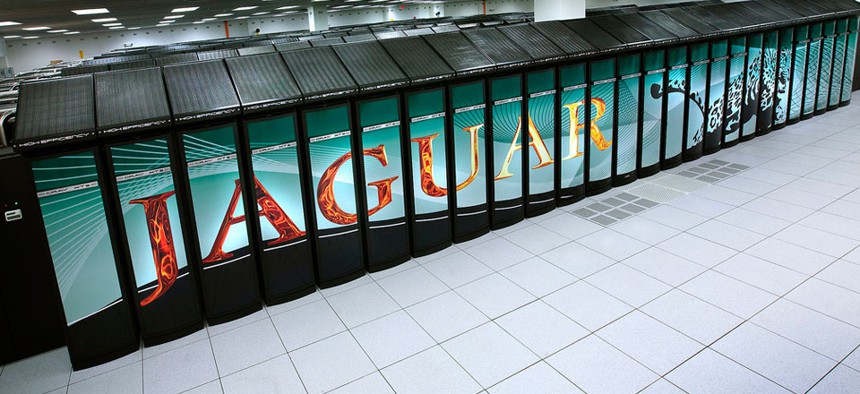House Committee Prods Energy Department to Use More Supercomputers

The Energy Department's Jaguar Supercomputer Oak Ridge National Laboratory
The House Committee on Science, Space and Technology approved a bill that would require the Energy Department to invest in supercomputing research.
The House Committee on Science, Space and Technology today approved a bill that would require the Energy Department to research supercomputing technology that could increase computing capability while reducing power use.
Introduced by Rep. Randy Hultgren, R-Ill., the American Super Computing Leadership Act, which also requires Energy to partner with national laboratories on supercomputing research, was among four other technology-related bills approved by the committee during a Wednesday markup meeting.
The committee also approved the Department of Energy Laboratory Modernization and Technology Transfer Act of 2015, aimed at improving the management of national laboratories.
Another bill, the International Science and Technology Cooperation Act of 2015, would establish a body under the National Science and Technology Council to coordinate cooperation between researchers in the United States and abroad.
Though all bills were passed, Rep. Dana Rohrabacher, R-Calif., commented that the International Science and Technology Cooperation Act might have political implications.
"I take it that [the authors'] intent is not that we should be cooperating with scientists from countries that are governed by dictatorships, especially dictatorships that are hostile to the United States," he said.
"That especially means I don't believe we should be rushing into cooperation as we have -- we have certain degrees of cooperation already, scientifically -- with China, which is the world's worst human rights abuser … I would think it's very nice to think that we should cooperate with everybody scientifically, but I don't believe that that is rational."
Also passed was the Research and Development Efficiency Act, introduced by committee chair Rep. Barbara Comstock, R-Va., which aims to reduce administrative burdens on federally funded researchers.
On average, she said, researchers spend 42 percent of their time meeting federal regulatory and reporting requirements. The bill could ensure that “more of our federal research dollars are spent on research and not on these burdensome regulatory requirements," Comstock said.
The committee also approved the Science Prize Competitions Act, which aims to support federally funded challenge contests, such as those sponsored by NASA, the Defense Advanced Research Projects Agency and other groups.
To maximize technology transfer between the public and private sectors, "we must draw upon all of our nation's talent, whether they're researchers in a university lab, owners of a startup or independent innovators working in their own garage," Rep. Don Beyer, D-Va., said.
In opening remarks, Rep. Eddie Bernice Johnson, D-Texas, said she was concerned the committee hadn't taken up a broader catch-all bill, such as wide-reaching America COMPETES Act. Instead, member are "spending our time marking up a number of individual small bills," she said.
NEXT STORY: Why Big Data Gets a Bad Rap in Government





